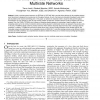Free Online Productivity Tools
i2Speak
i2Symbol
i2OCR
iTex2Img
iWeb2Print
iWeb2Shot
i2Type
iPdf2Split
iPdf2Merge
i2Bopomofo
i2Arabic
i2Style
i2Image
i2PDF
iLatex2Rtf
Sci2ools
99
Voted
TMC
2008
2008
Airtime Fairness for IEEE 802.11 Multirate Networks
Under a multirate network scenario, the IEEE 802.11 DCF MAC fails to provide airtime fairness for all competing stations since the protocol is designed for ensuring max-min throughput fairness. As such, the maximum achievable throughput by any station gets bounded by the slowest transmitting peer. In this paper, we present an analytical model to study the delay and throughput characteristics of such networks so that the rate anomaly problem of IEEE DCF multirate networks could be mitigated. We call our proposal Time Fair CSMA (TFCSMA) which utilizes an interesting baseline property for estimating a target throughput for each competing station so that its minimum contention window could be adjusted in a distributed manner. As opposed to the previous work in this area, TFCSMA is ideally suited for practical scenarios where stations frequently adapt their data rates to changing channel conditions. In addition, TFCSMA also accounts for packet errors due to the time varying properties of th...
Related Content
| Added | 15 Dec 2010 |
| Updated | 15 Dec 2010 |
| Type | Journal |
| Year | 2008 |
| Where | TMC |
| Authors | Tarun Joshi, Anindo Mukherjee, Younghwan Yoo, Dharma P. Agrawal |
Comments (0)

